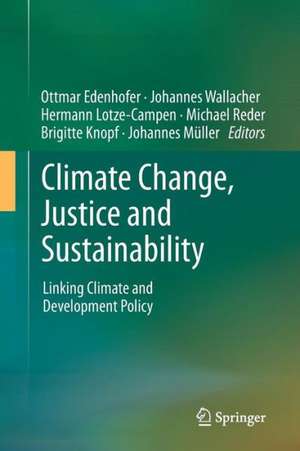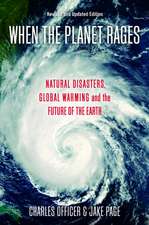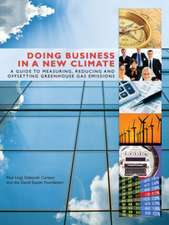Climate Change, Justice and Sustainability: Linking Climate and Development Policy
Editat de Ottmar Edenhofer, Johannes Wallacher, Hermann Lotze-Campen, Michael Reder, Brigitte Knopf, Johannes Mülleren Limba Engleză Paperback – 18 iul 2014
| Toate formatele și edițiile | Preț | Express |
|---|---|---|
| Paperback (1) | 645.60 lei 6-8 săpt. | |
| SPRINGER NETHERLANDS – 18 iul 2014 | 645.60 lei 6-8 săpt. | |
| Hardback (1) | 651.99 lei 6-8 săpt. | |
| SPRINGER NETHERLANDS – 28 iun 2012 | 651.99 lei 6-8 săpt. |
Preț: 645.60 lei
Preț vechi: 759.54 lei
-15% Nou
Puncte Express: 968
Preț estimativ în valută:
123.54€ • 132.10$ • 103.00£
123.54€ • 132.10$ • 103.00£
Carte tipărită la comandă
Livrare economică 18 aprilie-02 mai
Preluare comenzi: 021 569.72.76
Specificații
ISBN-13: 9789400799028
ISBN-10: 9400799020
Pagini: 404
Ilustrații: XXII, 382 p.
Dimensiuni: 155 x 235 x 21 mm
Greutate: 0.56 kg
Ediția:2012
Editura: SPRINGER NETHERLANDS
Colecția Springer
Locul publicării:Dordrecht, Netherlands
ISBN-10: 9400799020
Pagini: 404
Ilustrații: XXII, 382 p.
Dimensiuni: 155 x 235 x 21 mm
Greutate: 0.56 kg
Ediția:2012
Editura: SPRINGER NETHERLANDS
Colecția Springer
Locul publicării:Dordrecht, Netherlands
Public țintă
ResearchCuprins
Preface.-Introduction.- PART I: Climate Impacts and Vulnerability.- 1. Vulnerability to Climate Change and Poverty.- 2. Climate Change and Water Supply.- 3. Food Security in a Changing Climate.- 4. Vulnerability of Coastal Populations.- PART II: Human Rights, Justice And Development.- 5. Climate Change and Human Rights.- 6. Triangle of Justice.- 7. Development as Enhancement of Life Chances.- 8. Criteria for Compatibility of Climate and Development Policies.- 9. Regulatory Policy: Guiding Social Principles and Individual Responsibility.- 10. Cultures and Religions.- PART III: Climate Change Mitigation Options: Challenges and Costs.- 11. The 2°C Target Reconsidered.- 12. Climate Change Mitigation: Options, Costs and Risks.- 13. Land Use Management for Greenhouse Gas Mitigation.- PART IV: Climate Change Adaptation Options: Challenges And Costs.- 14. Adaptation in Water Management.- 15. Agricultural Adaptation Options: Production Technology, Insurance, Trade.- 16. The Role Of Ecosystem Services in Increasing the Adaptive Capacity of the Poor.- PART V: Case Studies on Climate Change Adaptation and Mitigation.- 17. Adaptation Options to Climate-Induced Glacier Retreat in Bolivia.- 18. Adaptation Options for Small Rice Farmers in the Philippines.- 19. Deforestation, Indigenous Peoples, and the Poor in Indonesia.- 20. Barriers for Avoiding Deforestation in Ecuador.- 21. Potentials and Limitations of Microinsurance for Protecting the Poor.- 22. From The Last Mile to the First: Risk Awareness is the Key.- 23. The Role of Development Cooperation in Climate Change Adaptation.- PART VI: A Global Deal For Linking Climate And Development Policy.- 24. Climate Policy in a Decentralized World.- 25. A Global Carbon Market and the Allocation of Emission Rights.- 26. Mechanisms for Avoiding Deforestation and Forest Degradation.- 27. Worldwide Promotion and Diffusion of Climate-Friendly Technologies.- 28. International Adaptation Funding.- 29. Strengthening Development Politics and Global Partnership.- 30. Sustainable Development as a Cornerstone of a Future Energy System.- Regional Dialogues On Climate Change and Justice: A Synthesis.- Index.
Textul de pe ultima copertă
Rich nations are mainly responsible for global greenhouse gas emissions, and they are financially and institutionally better placed to adapt to the impacts of global climate change. Developing countries, though, must face issues such as severe droughts, floods, and other environmental changes associated with the Earth’s warming, with far fewer resources to adapt at their disposal. This volume examines the way climate change is affecting the lives and environments of the poor. It provides a global picture of these impacts as well as finer detail on specific regions. The result of a major research project co-funded by various scientific and development organisations, it combines scientific results about the causes, consequences, and economics of climate change with ethical implications for development policy and sustainability.
Analysing and synthesising vast data sets from a multitude of disciplines including climate science, economics, hydrology and agricultural research, it seeks new methods of combining climate change mitigation, adaptation, development, and poverty reduction in ways that are effective, efficient and equitable. A guiding principle of the project is that new alliances of state and non-state sector partners are urgently required to establish cooperative responses to the threats posed by climate change. This volume offers a vital policy framework for linking our response to this change with progressive principles of global justice and sustainable development.
Analysing and synthesising vast data sets from a multitude of disciplines including climate science, economics, hydrology and agricultural research, it seeks new methods of combining climate change mitigation, adaptation, development, and poverty reduction in ways that are effective, efficient and equitable. A guiding principle of the project is that new alliances of state and non-state sector partners are urgently required to establish cooperative responses to the threats posed by climate change. This volume offers a vital policy framework for linking our response to this change with progressive principles of global justice and sustainable development.
Caracteristici
Provides a state-of-the-art overview of research on climate impacts, adaptation, and mitigation Outlines a policy framework for linking climate change, global justice, and sustainable development Timely background and input to the RIO+20 summit and climate negotiations at COP18 in Qatar Covers interdisciplinary research results from climate science, development economics, ethics, hydrology, and agriculture







